International Hospitality Management: IHG Report, SWOT, PEST Analysis
VerifiedAdded on 2023/01/06
|16
|4571
|76
Report
AI Summary
This report provides a comprehensive analysis of Intercontinental Hotels Group (IHG), a leading multinational hospitality company. It begins with an introduction to hospitality management and the structure of the hospitality industry. The main body of the report includes an overview of IHG's background, a detailed SWOT analysis evaluating its strengths, weaknesses, opportunities, and threats, and an examination of emerging markets with a focus on Australia. The report incorporates a PEST analysis of Australia, assessing its political, economic, social, technological, environmental, and legal factors. Furthermore, it explores potential hotel strategies, including Porter's Generic Strategies and Ansoff Matrix, and justifies the adoption of these strategies, followed by the practical application of the chosen strategies. The report concludes by summarizing the key findings and insights regarding IHG's operations and strategies in the international hospitality sector. References are also included.
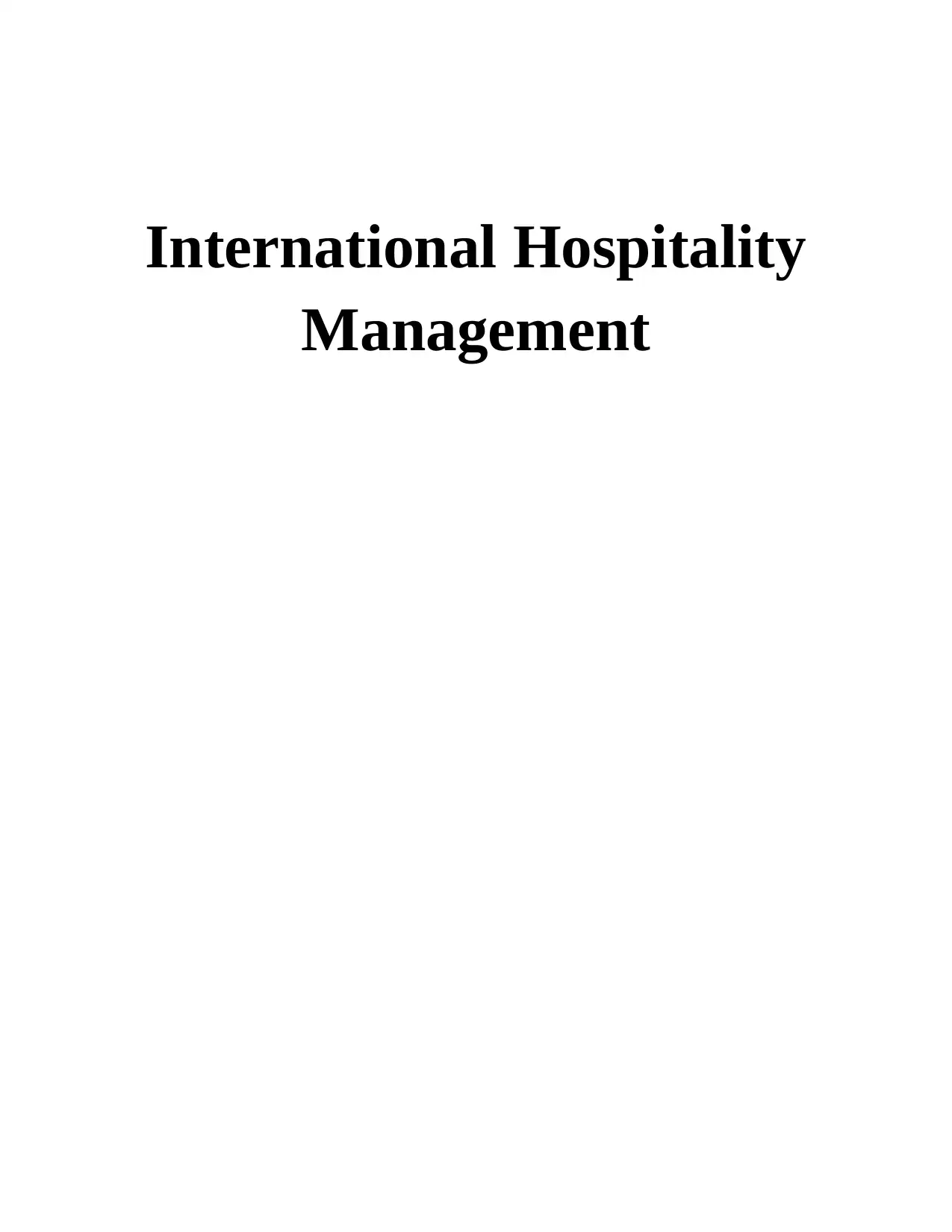
International Hospitality
Management
Management
Paraphrase This Document
Need a fresh take? Get an instant paraphrase of this document with our AI Paraphraser

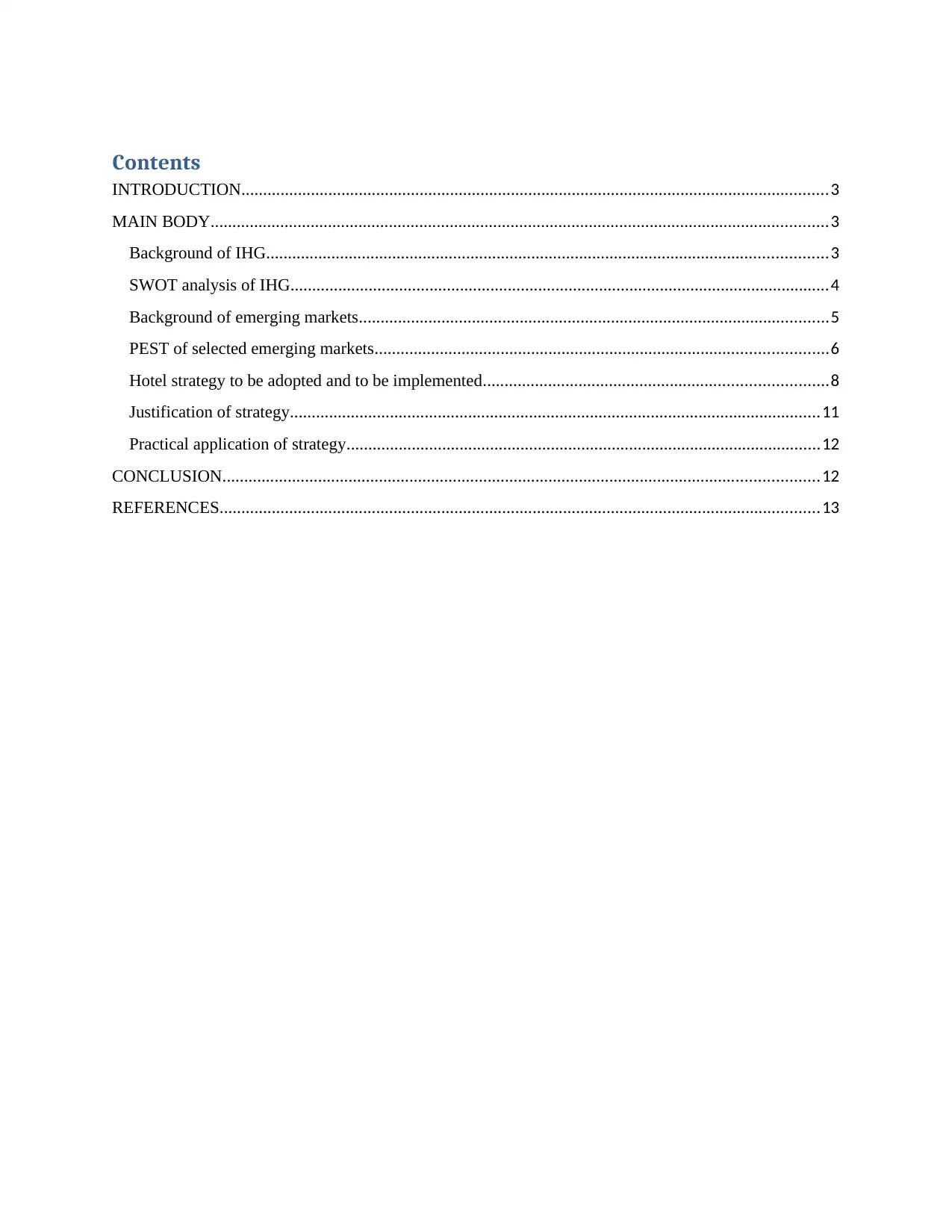
Contents
INTRODUCTION.......................................................................................................................................3
MAIN BODY..............................................................................................................................................3
Background of IHG.................................................................................................................................3
SWOT analysis of IHG............................................................................................................................4
Background of emerging markets............................................................................................................5
PEST of selected emerging markets........................................................................................................6
Hotel strategy to be adopted and to be implemented...............................................................................8
Justification of strategy..........................................................................................................................11
Practical application of strategy.............................................................................................................12
CONCLUSION.........................................................................................................................................12
REFERENCES..........................................................................................................................................13
INTRODUCTION.......................................................................................................................................3
MAIN BODY..............................................................................................................................................3
Background of IHG.................................................................................................................................3
SWOT analysis of IHG............................................................................................................................4
Background of emerging markets............................................................................................................5
PEST of selected emerging markets........................................................................................................6
Hotel strategy to be adopted and to be implemented...............................................................................8
Justification of strategy..........................................................................................................................11
Practical application of strategy.............................................................................................................12
CONCLUSION.........................................................................................................................................12
REFERENCES..........................................................................................................................................13
⊘ This is a preview!⊘
Do you want full access?
Subscribe today to unlock all pages.

Trusted by 1+ million students worldwide
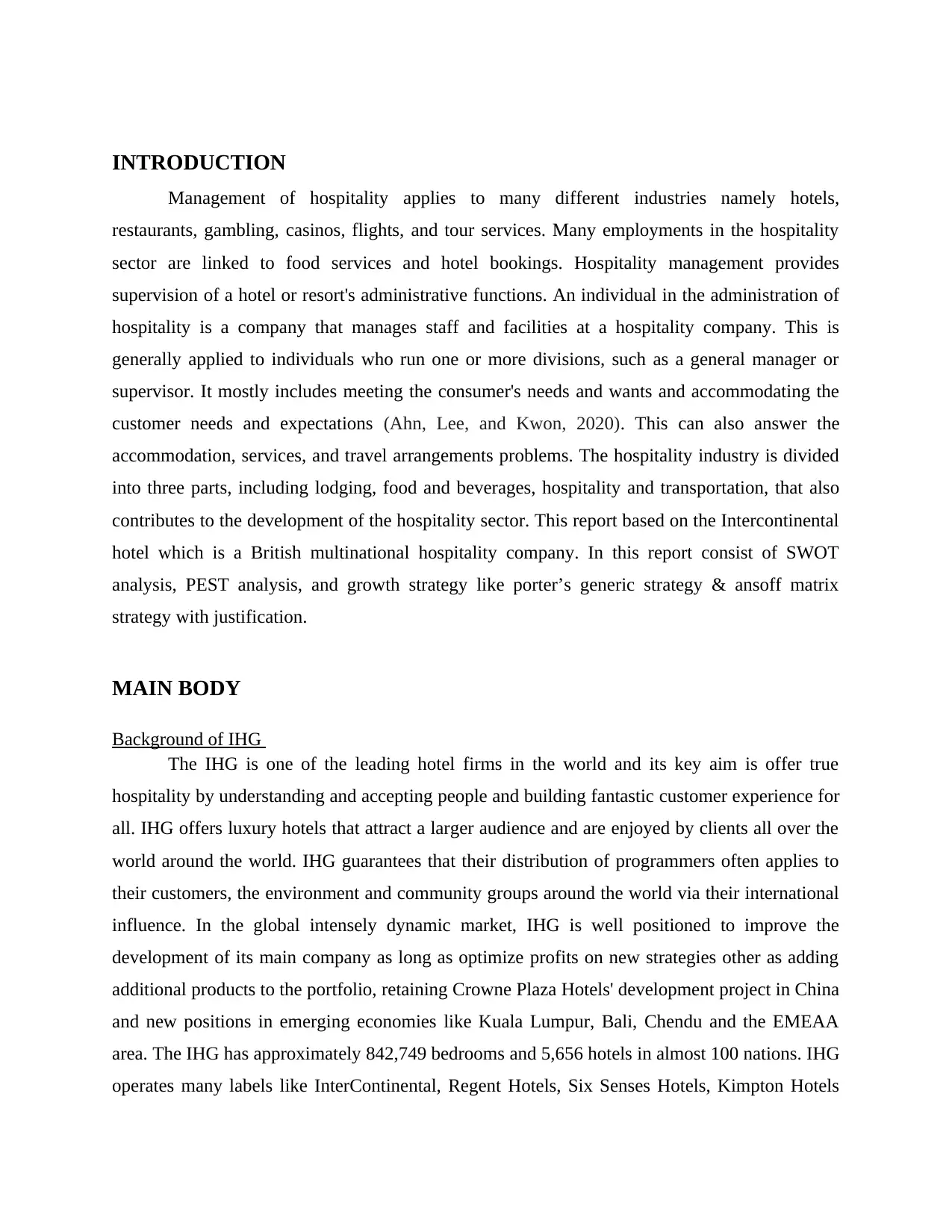
INTRODUCTION
Management of hospitality applies to many different industries namely hotels,
restaurants, gambling, casinos, flights, and tour services. Many employments in the hospitality
sector are linked to food services and hotel bookings. Hospitality management provides
supervision of a hotel or resort's administrative functions. An individual in the administration of
hospitality is a company that manages staff and facilities at a hospitality company. This is
generally applied to individuals who run one or more divisions, such as a general manager or
supervisor. It mostly includes meeting the consumer's needs and wants and accommodating the
customer needs and expectations (Ahn, Lee, and Kwon, 2020). This can also answer the
accommodation, services, and travel arrangements problems. The hospitality industry is divided
into three parts, including lodging, food and beverages, hospitality and transportation, that also
contributes to the development of the hospitality sector. This report based on the Intercontinental
hotel which is a British multinational hospitality company. In this report consist of SWOT
analysis, PEST analysis, and growth strategy like porter’s generic strategy & ansoff matrix
strategy with justification.
MAIN BODY
Background of IHG
The IHG is one of the leading hotel firms in the world and its key aim is offer true
hospitality by understanding and accepting people and building fantastic customer experience for
all. IHG offers luxury hotels that attract a larger audience and are enjoyed by clients all over the
world around the world. IHG guarantees that their distribution of programmers often applies to
their customers, the environment and community groups around the world via their international
influence. In the global intensely dynamic market, IHG is well positioned to improve the
development of its main company as long as optimize profits on new strategies other as adding
additional products to the portfolio, retaining Crowne Plaza Hotels' development project in China
and new positions in emerging economies like Kuala Lumpur, Bali, Chendu and the EMEAA
area. The IHG has approximately 842,749 bedrooms and 5,656 hotels in almost 100 nations. IHG
operates many labels like InterContinental, Regent Hotels, Six Senses Hotels, Kimpton Hotels
Management of hospitality applies to many different industries namely hotels,
restaurants, gambling, casinos, flights, and tour services. Many employments in the hospitality
sector are linked to food services and hotel bookings. Hospitality management provides
supervision of a hotel or resort's administrative functions. An individual in the administration of
hospitality is a company that manages staff and facilities at a hospitality company. This is
generally applied to individuals who run one or more divisions, such as a general manager or
supervisor. It mostly includes meeting the consumer's needs and wants and accommodating the
customer needs and expectations (Ahn, Lee, and Kwon, 2020). This can also answer the
accommodation, services, and travel arrangements problems. The hospitality industry is divided
into three parts, including lodging, food and beverages, hospitality and transportation, that also
contributes to the development of the hospitality sector. This report based on the Intercontinental
hotel which is a British multinational hospitality company. In this report consist of SWOT
analysis, PEST analysis, and growth strategy like porter’s generic strategy & ansoff matrix
strategy with justification.
MAIN BODY
Background of IHG
The IHG is one of the leading hotel firms in the world and its key aim is offer true
hospitality by understanding and accepting people and building fantastic customer experience for
all. IHG offers luxury hotels that attract a larger audience and are enjoyed by clients all over the
world around the world. IHG guarantees that their distribution of programmers often applies to
their customers, the environment and community groups around the world via their international
influence. In the global intensely dynamic market, IHG is well positioned to improve the
development of its main company as long as optimize profits on new strategies other as adding
additional products to the portfolio, retaining Crowne Plaza Hotels' development project in China
and new positions in emerging economies like Kuala Lumpur, Bali, Chendu and the EMEAA
area. The IHG has approximately 842,749 bedrooms and 5,656 hotels in almost 100 nations. IHG
operates many labels like InterContinental, Regent Hotels, Six Senses Hotels, Kimpton Hotels
Paraphrase This Document
Need a fresh take? Get an instant paraphrase of this document with our AI Paraphraser
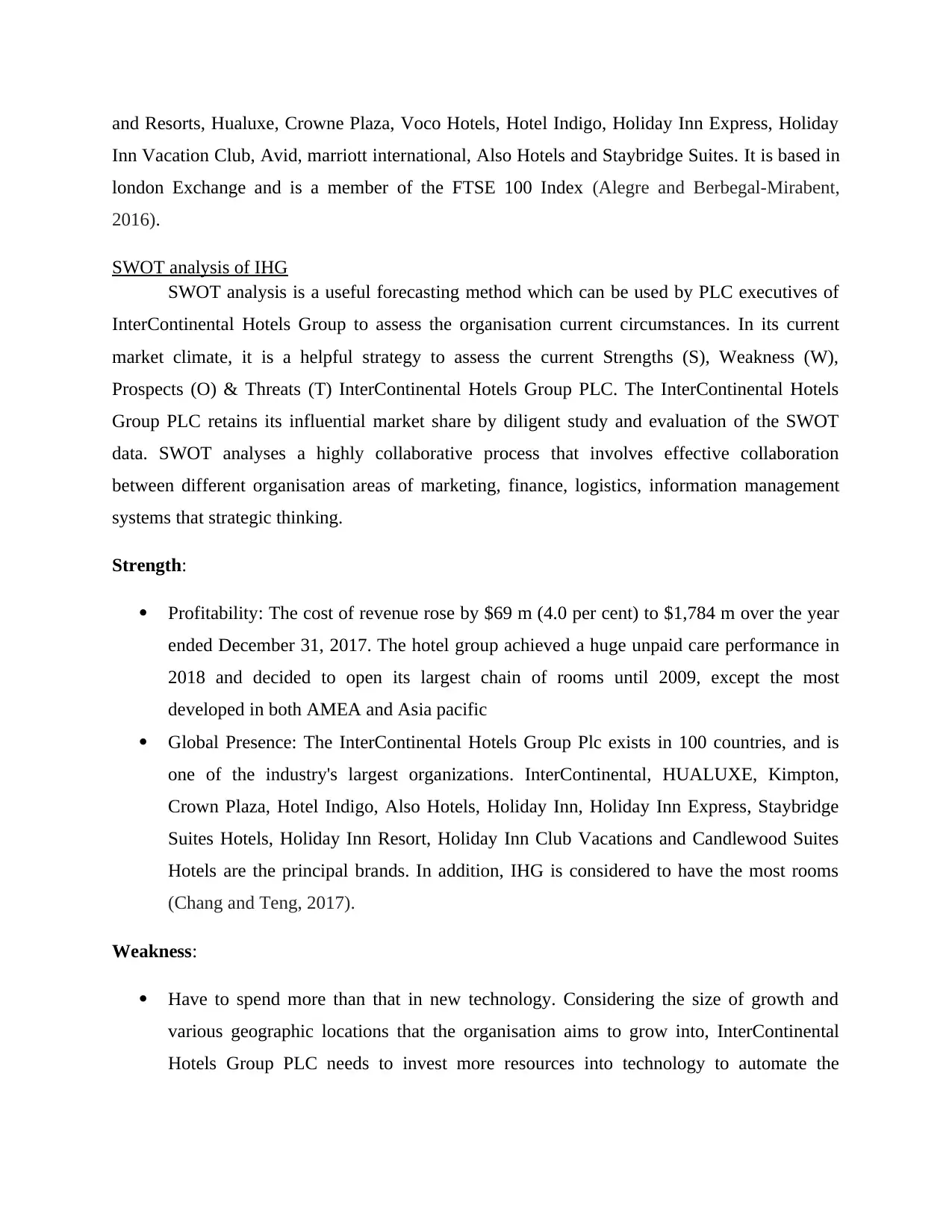
and Resorts, Hualuxe, Crowne Plaza, Voco Hotels, Hotel Indigo, Holiday Inn Express, Holiday
Inn Vacation Club, Avid, marriott international, Also Hotels and Staybridge Suites. It is based in
london Exchange and is a member of the FTSE 100 Index (Alegre and Berbegal-Mirabent,
2016).
SWOT analysis of IHG
SWOT analysis is a useful forecasting method which can be used by PLC executives of
InterContinental Hotels Group to assess the organisation current circumstances. In its current
market climate, it is a helpful strategy to assess the current Strengths (S), Weakness (W),
Prospects (O) & Threats (T) InterContinental Hotels Group PLC. The InterContinental Hotels
Group PLC retains its influential market share by diligent study and evaluation of the SWOT
data. SWOT analyses a highly collaborative process that involves effective collaboration
between different organisation areas of marketing, finance, logistics, information management
systems that strategic thinking.
Strength:
Profitability: The cost of revenue rose by $69 m (4.0 per cent) to $1,784 m over the year
ended December 31, 2017. The hotel group achieved a huge unpaid care performance in
2018 and decided to open its largest chain of rooms until 2009, except the most
developed in both AMEA and Asia pacific
Global Presence: The InterContinental Hotels Group Plc exists in 100 countries, and is
one of the industry's largest organizations. InterContinental, HUALUXE, Kimpton,
Crown Plaza, Hotel Indigo, Also Hotels, Holiday Inn, Holiday Inn Express, Staybridge
Suites Hotels, Holiday Inn Resort, Holiday Inn Club Vacations and Candlewood Suites
Hotels are the principal brands. In addition, IHG is considered to have the most rooms
(Chang and Teng, 2017).
Weakness:
Have to spend more than that in new technology. Considering the size of growth and
various geographic locations that the organisation aims to grow into, InterContinental
Hotels Group PLC needs to invest more resources into technology to automate the
Inn Vacation Club, Avid, marriott international, Also Hotels and Staybridge Suites. It is based in
london Exchange and is a member of the FTSE 100 Index (Alegre and Berbegal-Mirabent,
2016).
SWOT analysis of IHG
SWOT analysis is a useful forecasting method which can be used by PLC executives of
InterContinental Hotels Group to assess the organisation current circumstances. In its current
market climate, it is a helpful strategy to assess the current Strengths (S), Weakness (W),
Prospects (O) & Threats (T) InterContinental Hotels Group PLC. The InterContinental Hotels
Group PLC retains its influential market share by diligent study and evaluation of the SWOT
data. SWOT analyses a highly collaborative process that involves effective collaboration
between different organisation areas of marketing, finance, logistics, information management
systems that strategic thinking.
Strength:
Profitability: The cost of revenue rose by $69 m (4.0 per cent) to $1,784 m over the year
ended December 31, 2017. The hotel group achieved a huge unpaid care performance in
2018 and decided to open its largest chain of rooms until 2009, except the most
developed in both AMEA and Asia pacific
Global Presence: The InterContinental Hotels Group Plc exists in 100 countries, and is
one of the industry's largest organizations. InterContinental, HUALUXE, Kimpton,
Crown Plaza, Hotel Indigo, Also Hotels, Holiday Inn, Holiday Inn Express, Staybridge
Suites Hotels, Holiday Inn Resort, Holiday Inn Club Vacations and Candlewood Suites
Hotels are the principal brands. In addition, IHG is considered to have the most rooms
(Chang and Teng, 2017).
Weakness:
Have to spend more than that in new technology. Considering the size of growth and
various geographic locations that the organisation aims to grow into, InterContinental
Hotels Group PLC needs to invest more resources into technology to automate the
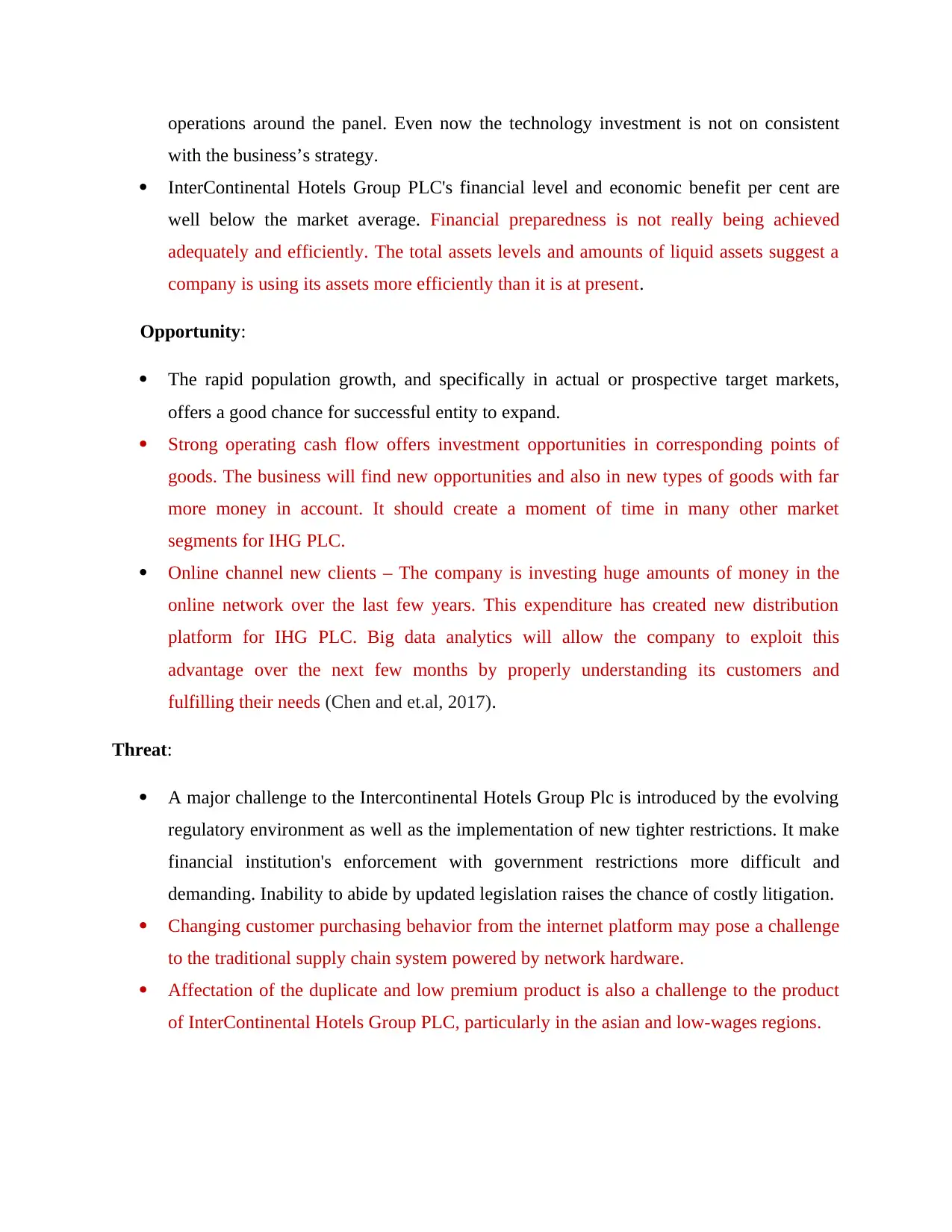
operations around the panel. Even now the technology investment is not on consistent
with the business’s strategy.
InterContinental Hotels Group PLC's financial level and economic benefit per cent are
well below the market average. Financial preparedness is not really being achieved
adequately and efficiently. The total assets levels and amounts of liquid assets suggest a
company is using its assets more efficiently than it is at present.
Opportunity:
The rapid population growth, and specifically in actual or prospective target markets,
offers a good chance for successful entity to expand.
Strong operating cash flow offers investment opportunities in corresponding points of
goods. The business will find new opportunities and also in new types of goods with far
more money in account. It should create a moment of time in many other market
segments for IHG PLC.
Online channel new clients – The company is investing huge amounts of money in the
online network over the last few years. This expenditure has created new distribution
platform for IHG PLC. Big data analytics will allow the company to exploit this
advantage over the next few months by properly understanding its customers and
fulfilling their needs (Chen and et.al, 2017).
Threat:
A major challenge to the Intercontinental Hotels Group Plc is introduced by the evolving
regulatory environment as well as the implementation of new tighter restrictions. It make
financial institution's enforcement with government restrictions more difficult and
demanding. Inability to abide by updated legislation raises the chance of costly litigation.
Changing customer purchasing behavior from the internet platform may pose a challenge
to the traditional supply chain system powered by network hardware.
Affectation of the duplicate and low premium product is also a challenge to the product
of InterContinental Hotels Group PLC, particularly in the asian and low-wages regions.
with the business’s strategy.
InterContinental Hotels Group PLC's financial level and economic benefit per cent are
well below the market average. Financial preparedness is not really being achieved
adequately and efficiently. The total assets levels and amounts of liquid assets suggest a
company is using its assets more efficiently than it is at present.
Opportunity:
The rapid population growth, and specifically in actual or prospective target markets,
offers a good chance for successful entity to expand.
Strong operating cash flow offers investment opportunities in corresponding points of
goods. The business will find new opportunities and also in new types of goods with far
more money in account. It should create a moment of time in many other market
segments for IHG PLC.
Online channel new clients – The company is investing huge amounts of money in the
online network over the last few years. This expenditure has created new distribution
platform for IHG PLC. Big data analytics will allow the company to exploit this
advantage over the next few months by properly understanding its customers and
fulfilling their needs (Chen and et.al, 2017).
Threat:
A major challenge to the Intercontinental Hotels Group Plc is introduced by the evolving
regulatory environment as well as the implementation of new tighter restrictions. It make
financial institution's enforcement with government restrictions more difficult and
demanding. Inability to abide by updated legislation raises the chance of costly litigation.
Changing customer purchasing behavior from the internet platform may pose a challenge
to the traditional supply chain system powered by network hardware.
Affectation of the duplicate and low premium product is also a challenge to the product
of InterContinental Hotels Group PLC, particularly in the asian and low-wages regions.
⊘ This is a preview!⊘
Do you want full access?
Subscribe today to unlock all pages.

Trusted by 1+ million students worldwide
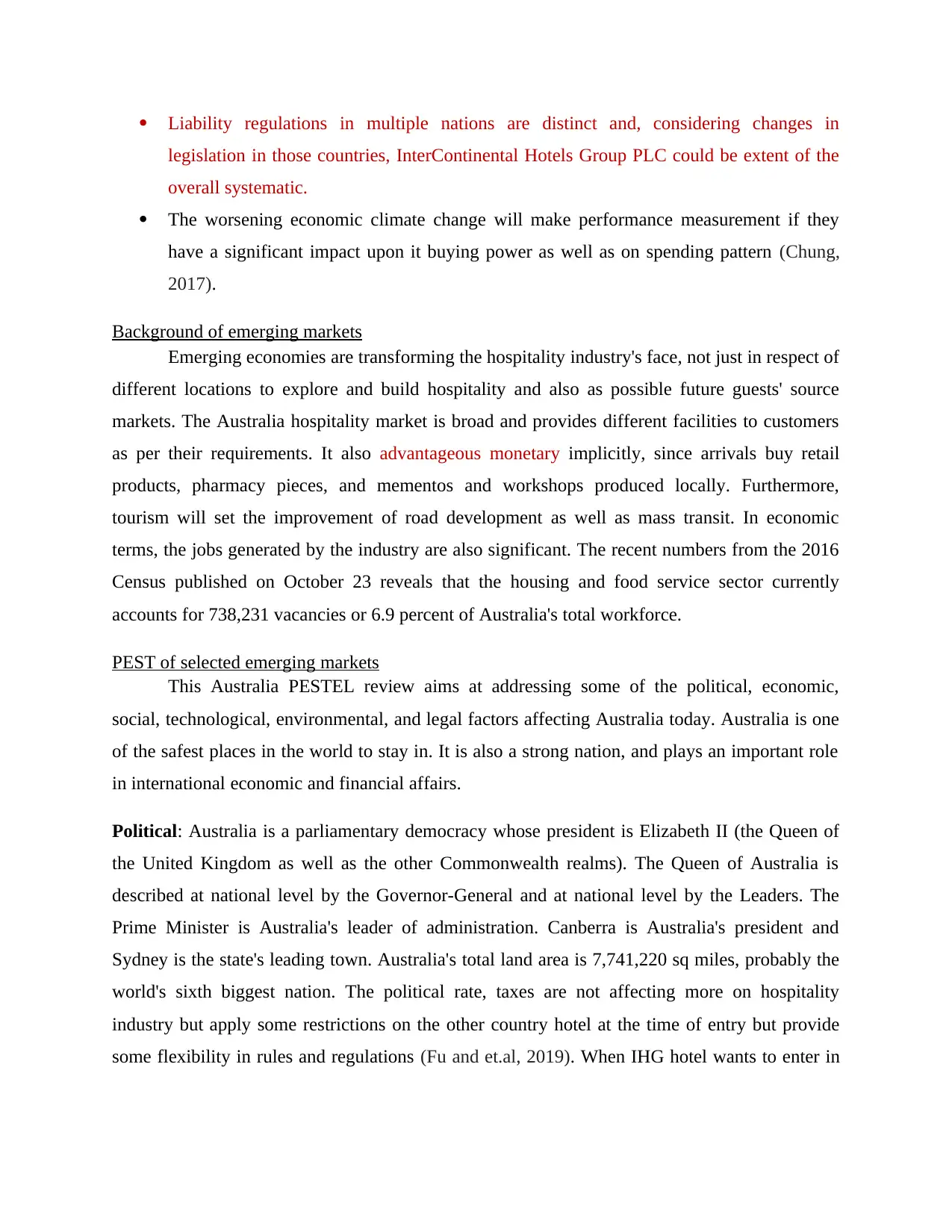
Liability regulations in multiple nations are distinct and, considering changes in
legislation in those countries, InterContinental Hotels Group PLC could be extent of the
overall systematic.
The worsening economic climate change will make performance measurement if they
have a significant impact upon it buying power as well as on spending pattern (Chung,
2017).
Background of emerging markets
Emerging economies are transforming the hospitality industry's face, not just in respect of
different locations to explore and build hospitality and also as possible future guests' source
markets. The Australia hospitality market is broad and provides different facilities to customers
as per their requirements. It also advantageous monetary implicitly, since arrivals buy retail
products, pharmacy pieces, and mementos and workshops produced locally. Furthermore,
tourism will set the improvement of road development as well as mass transit. In economic
terms, the jobs generated by the industry are also significant. The recent numbers from the 2016
Census published on October 23 reveals that the housing and food service sector currently
accounts for 738,231 vacancies or 6.9 percent of Australia's total workforce.
PEST of selected emerging markets
This Australia PESTEL review aims at addressing some of the political, economic,
social, technological, environmental, and legal factors affecting Australia today. Australia is one
of the safest places in the world to stay in. It is also a strong nation, and plays an important role
in international economic and financial affairs.
Political: Australia is a parliamentary democracy whose president is Elizabeth II (the Queen of
the United Kingdom as well as the other Commonwealth realms). The Queen of Australia is
described at national level by the Governor-General and at national level by the Leaders. The
Prime Minister is Australia's leader of administration. Canberra is Australia's president and
Sydney is the state's leading town. Australia's total land area is 7,741,220 sq miles, probably the
world's sixth biggest nation. The political rate, taxes are not affecting more on hospitality
industry but apply some restrictions on the other country hotel at the time of entry but provide
some flexibility in rules and regulations (Fu and et.al, 2019). When IHG hotel wants to enter in
legislation in those countries, InterContinental Hotels Group PLC could be extent of the
overall systematic.
The worsening economic climate change will make performance measurement if they
have a significant impact upon it buying power as well as on spending pattern (Chung,
2017).
Background of emerging markets
Emerging economies are transforming the hospitality industry's face, not just in respect of
different locations to explore and build hospitality and also as possible future guests' source
markets. The Australia hospitality market is broad and provides different facilities to customers
as per their requirements. It also advantageous monetary implicitly, since arrivals buy retail
products, pharmacy pieces, and mementos and workshops produced locally. Furthermore,
tourism will set the improvement of road development as well as mass transit. In economic
terms, the jobs generated by the industry are also significant. The recent numbers from the 2016
Census published on October 23 reveals that the housing and food service sector currently
accounts for 738,231 vacancies or 6.9 percent of Australia's total workforce.
PEST of selected emerging markets
This Australia PESTEL review aims at addressing some of the political, economic,
social, technological, environmental, and legal factors affecting Australia today. Australia is one
of the safest places in the world to stay in. It is also a strong nation, and plays an important role
in international economic and financial affairs.
Political: Australia is a parliamentary democracy whose president is Elizabeth II (the Queen of
the United Kingdom as well as the other Commonwealth realms). The Queen of Australia is
described at national level by the Governor-General and at national level by the Leaders. The
Prime Minister is Australia's leader of administration. Canberra is Australia's president and
Sydney is the state's leading town. Australia's total land area is 7,741,220 sq miles, probably the
world's sixth biggest nation. The political rate, taxes are not affecting more on hospitality
industry but apply some restrictions on the other country hotel at the time of entry but provide
some flexibility in rules and regulations (Fu and et.al, 2019). When IHG hotel wants to enter in
Paraphrase This Document
Need a fresh take? Get an instant paraphrase of this document with our AI Paraphraser
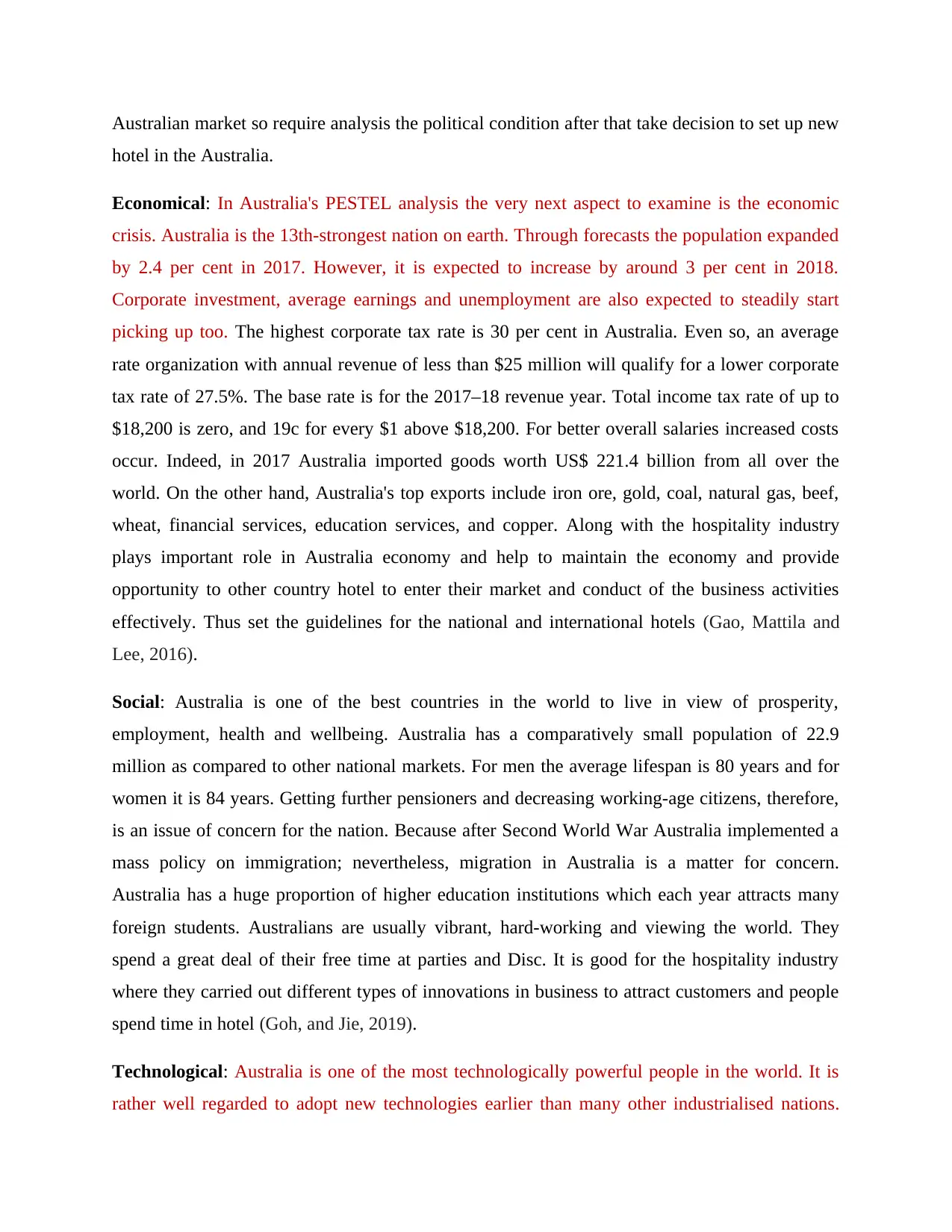
Australian market so require analysis the political condition after that take decision to set up new
hotel in the Australia.
Economical: In Australia's PESTEL analysis the very next aspect to examine is the economic
crisis. Australia is the 13th-strongest nation on earth. Through forecasts the population expanded
by 2.4 per cent in 2017. However, it is expected to increase by around 3 per cent in 2018.
Corporate investment, average earnings and unemployment are also expected to steadily start
picking up too. The highest corporate tax rate is 30 per cent in Australia. Even so, an average
rate organization with annual revenue of less than $25 million will qualify for a lower corporate
tax rate of 27.5%. The base rate is for the 2017–18 revenue year. Total income tax rate of up to
$18,200 is zero, and 19c for every $1 above $18,200. For better overall salaries increased costs
occur. Indeed, in 2017 Australia imported goods worth US$ 221.4 billion from all over the
world. On the other hand, Australia's top exports include iron ore, gold, coal, natural gas, beef,
wheat, financial services, education services, and copper. Along with the hospitality industry
plays important role in Australia economy and help to maintain the economy and provide
opportunity to other country hotel to enter their market and conduct of the business activities
effectively. Thus set the guidelines for the national and international hotels (Gao, Mattila and
Lee, 2016).
Social: Australia is one of the best countries in the world to live in view of prosperity,
employment, health and wellbeing. Australia has a comparatively small population of 22.9
million as compared to other national markets. For men the average lifespan is 80 years and for
women it is 84 years. Getting further pensioners and decreasing working-age citizens, therefore,
is an issue of concern for the nation. Because after Second World War Australia implemented a
mass policy on immigration; nevertheless, migration in Australia is a matter for concern.
Australia has a huge proportion of higher education institutions which each year attracts many
foreign students. Australians are usually vibrant, hard-working and viewing the world. They
spend a great deal of their free time at parties and Disc. It is good for the hospitality industry
where they carried out different types of innovations in business to attract customers and people
spend time in hotel (Goh, and Jie, 2019).
Technological: Australia is one of the most technologically powerful people in the world. It is
rather well regarded to adopt new technologies earlier than many other industrialised nations.
hotel in the Australia.
Economical: In Australia's PESTEL analysis the very next aspect to examine is the economic
crisis. Australia is the 13th-strongest nation on earth. Through forecasts the population expanded
by 2.4 per cent in 2017. However, it is expected to increase by around 3 per cent in 2018.
Corporate investment, average earnings and unemployment are also expected to steadily start
picking up too. The highest corporate tax rate is 30 per cent in Australia. Even so, an average
rate organization with annual revenue of less than $25 million will qualify for a lower corporate
tax rate of 27.5%. The base rate is for the 2017–18 revenue year. Total income tax rate of up to
$18,200 is zero, and 19c for every $1 above $18,200. For better overall salaries increased costs
occur. Indeed, in 2017 Australia imported goods worth US$ 221.4 billion from all over the
world. On the other hand, Australia's top exports include iron ore, gold, coal, natural gas, beef,
wheat, financial services, education services, and copper. Along with the hospitality industry
plays important role in Australia economy and help to maintain the economy and provide
opportunity to other country hotel to enter their market and conduct of the business activities
effectively. Thus set the guidelines for the national and international hotels (Gao, Mattila and
Lee, 2016).
Social: Australia is one of the best countries in the world to live in view of prosperity,
employment, health and wellbeing. Australia has a comparatively small population of 22.9
million as compared to other national markets. For men the average lifespan is 80 years and for
women it is 84 years. Getting further pensioners and decreasing working-age citizens, therefore,
is an issue of concern for the nation. Because after Second World War Australia implemented a
mass policy on immigration; nevertheless, migration in Australia is a matter for concern.
Australia has a huge proportion of higher education institutions which each year attracts many
foreign students. Australians are usually vibrant, hard-working and viewing the world. They
spend a great deal of their free time at parties and Disc. It is good for the hospitality industry
where they carried out different types of innovations in business to attract customers and people
spend time in hotel (Goh, and Jie, 2019).
Technological: Australia is one of the most technologically powerful people in the world. It is
rather well regarded to adopt new technologies earlier than many other industrialised nations.
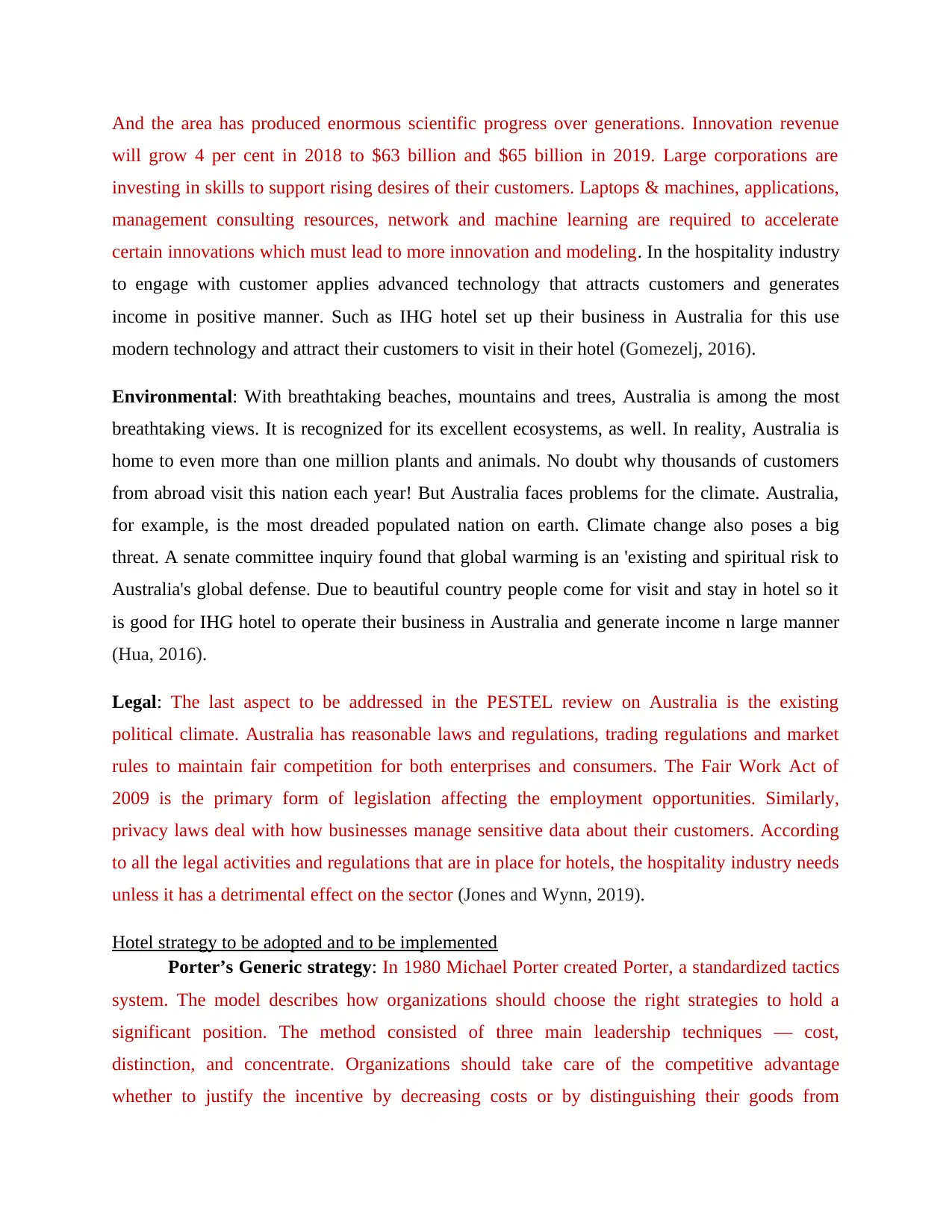
And the area has produced enormous scientific progress over generations. Innovation revenue
will grow 4 per cent in 2018 to $63 billion and $65 billion in 2019. Large corporations are
investing in skills to support rising desires of their customers. Laptops & machines, applications,
management consulting resources, network and machine learning are required to accelerate
certain innovations which must lead to more innovation and modeling. In the hospitality industry
to engage with customer applies advanced technology that attracts customers and generates
income in positive manner. Such as IHG hotel set up their business in Australia for this use
modern technology and attract their customers to visit in their hotel (Gomezelj, 2016).
Environmental: With breathtaking beaches, mountains and trees, Australia is among the most
breathtaking views. It is recognized for its excellent ecosystems, as well. In reality, Australia is
home to even more than one million plants and animals. No doubt why thousands of customers
from abroad visit this nation each year! But Australia faces problems for the climate. Australia,
for example, is the most dreaded populated nation on earth. Climate change also poses a big
threat. A senate committee inquiry found that global warming is an 'existing and spiritual risk to
Australia's global defense. Due to beautiful country people come for visit and stay in hotel so it
is good for IHG hotel to operate their business in Australia and generate income n large manner
(Hua, 2016).
Legal: The last aspect to be addressed in the PESTEL review on Australia is the existing
political climate. Australia has reasonable laws and regulations, trading regulations and market
rules to maintain fair competition for both enterprises and consumers. The Fair Work Act of
2009 is the primary form of legislation affecting the employment opportunities. Similarly,
privacy laws deal with how businesses manage sensitive data about their customers. According
to all the legal activities and regulations that are in place for hotels, the hospitality industry needs
unless it has a detrimental effect on the sector (Jones and Wynn, 2019).
Hotel strategy to be adopted and to be implemented
Porter’s Generic strategy: In 1980 Michael Porter created Porter, a standardized tactics
system. The model describes how organizations should choose the right strategies to hold a
significant position. The method consisted of three main leadership techniques — cost,
distinction, and concentrate. Organizations should take care of the competitive advantage
whether to justify the incentive by decreasing costs or by distinguishing their goods from
will grow 4 per cent in 2018 to $63 billion and $65 billion in 2019. Large corporations are
investing in skills to support rising desires of their customers. Laptops & machines, applications,
management consulting resources, network and machine learning are required to accelerate
certain innovations which must lead to more innovation and modeling. In the hospitality industry
to engage with customer applies advanced technology that attracts customers and generates
income in positive manner. Such as IHG hotel set up their business in Australia for this use
modern technology and attract their customers to visit in their hotel (Gomezelj, 2016).
Environmental: With breathtaking beaches, mountains and trees, Australia is among the most
breathtaking views. It is recognized for its excellent ecosystems, as well. In reality, Australia is
home to even more than one million plants and animals. No doubt why thousands of customers
from abroad visit this nation each year! But Australia faces problems for the climate. Australia,
for example, is the most dreaded populated nation on earth. Climate change also poses a big
threat. A senate committee inquiry found that global warming is an 'existing and spiritual risk to
Australia's global defense. Due to beautiful country people come for visit and stay in hotel so it
is good for IHG hotel to operate their business in Australia and generate income n large manner
(Hua, 2016).
Legal: The last aspect to be addressed in the PESTEL review on Australia is the existing
political climate. Australia has reasonable laws and regulations, trading regulations and market
rules to maintain fair competition for both enterprises and consumers. The Fair Work Act of
2009 is the primary form of legislation affecting the employment opportunities. Similarly,
privacy laws deal with how businesses manage sensitive data about their customers. According
to all the legal activities and regulations that are in place for hotels, the hospitality industry needs
unless it has a detrimental effect on the sector (Jones and Wynn, 2019).
Hotel strategy to be adopted and to be implemented
Porter’s Generic strategy: In 1980 Michael Porter created Porter, a standardized tactics
system. The model describes how organizations should choose the right strategies to hold a
significant position. The method consisted of three main leadership techniques — cost,
distinction, and concentrate. Organizations should take care of the competitive advantage
whether to justify the incentive by decreasing costs or by distinguishing their goods from
⊘ This is a preview!⊘
Do you want full access?
Subscribe today to unlock all pages.

Trusted by 1+ million students worldwide
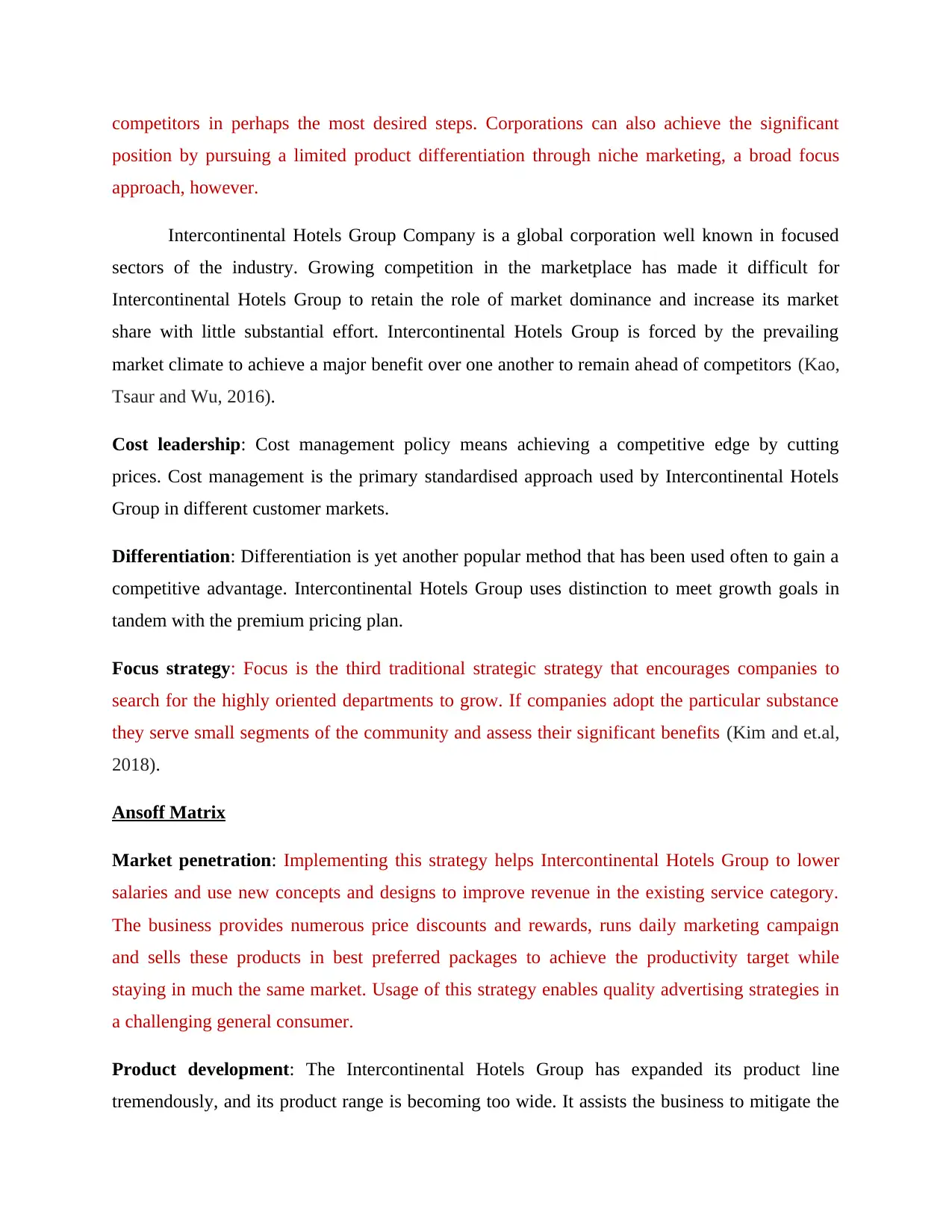
competitors in perhaps the most desired steps. Corporations can also achieve the significant
position by pursuing a limited product differentiation through niche marketing, a broad focus
approach, however.
Intercontinental Hotels Group Company is a global corporation well known in focused
sectors of the industry. Growing competition in the marketplace has made it difficult for
Intercontinental Hotels Group to retain the role of market dominance and increase its market
share with little substantial effort. Intercontinental Hotels Group is forced by the prevailing
market climate to achieve a major benefit over one another to remain ahead of competitors (Kao,
Tsaur and Wu, 2016).
Cost leadership: Cost management policy means achieving a competitive edge by cutting
prices. Cost management is the primary standardised approach used by Intercontinental Hotels
Group in different customer markets.
Differentiation: Differentiation is yet another popular method that has been used often to gain a
competitive advantage. Intercontinental Hotels Group uses distinction to meet growth goals in
tandem with the premium pricing plan.
Focus strategy: Focus is the third traditional strategic strategy that encourages companies to
search for the highly oriented departments to grow. If companies adopt the particular substance
they serve small segments of the community and assess their significant benefits (Kim and et.al,
2018).
Ansoff Matrix
Market penetration: Implementing this strategy helps Intercontinental Hotels Group to lower
salaries and use new concepts and designs to improve revenue in the existing service category.
The business provides numerous price discounts and rewards, runs daily marketing campaign
and sells these products in best preferred packages to achieve the productivity target while
staying in much the same market. Usage of this strategy enables quality advertising strategies in
a challenging general consumer.
Product development: The Intercontinental Hotels Group has expanded its product line
tremendously, and its product range is becoming too wide. It assists the business to mitigate the
position by pursuing a limited product differentiation through niche marketing, a broad focus
approach, however.
Intercontinental Hotels Group Company is a global corporation well known in focused
sectors of the industry. Growing competition in the marketplace has made it difficult for
Intercontinental Hotels Group to retain the role of market dominance and increase its market
share with little substantial effort. Intercontinental Hotels Group is forced by the prevailing
market climate to achieve a major benefit over one another to remain ahead of competitors (Kao,
Tsaur and Wu, 2016).
Cost leadership: Cost management policy means achieving a competitive edge by cutting
prices. Cost management is the primary standardised approach used by Intercontinental Hotels
Group in different customer markets.
Differentiation: Differentiation is yet another popular method that has been used often to gain a
competitive advantage. Intercontinental Hotels Group uses distinction to meet growth goals in
tandem with the premium pricing plan.
Focus strategy: Focus is the third traditional strategic strategy that encourages companies to
search for the highly oriented departments to grow. If companies adopt the particular substance
they serve small segments of the community and assess their significant benefits (Kim and et.al,
2018).
Ansoff Matrix
Market penetration: Implementing this strategy helps Intercontinental Hotels Group to lower
salaries and use new concepts and designs to improve revenue in the existing service category.
The business provides numerous price discounts and rewards, runs daily marketing campaign
and sells these products in best preferred packages to achieve the productivity target while
staying in much the same market. Usage of this strategy enables quality advertising strategies in
a challenging general consumer.
Product development: The Intercontinental Hotels Group has expanded its product line
tremendously, and its product range is becoming too wide. It assists the business to mitigate the
Paraphrase This Document
Need a fresh take? Get an instant paraphrase of this document with our AI Paraphraser
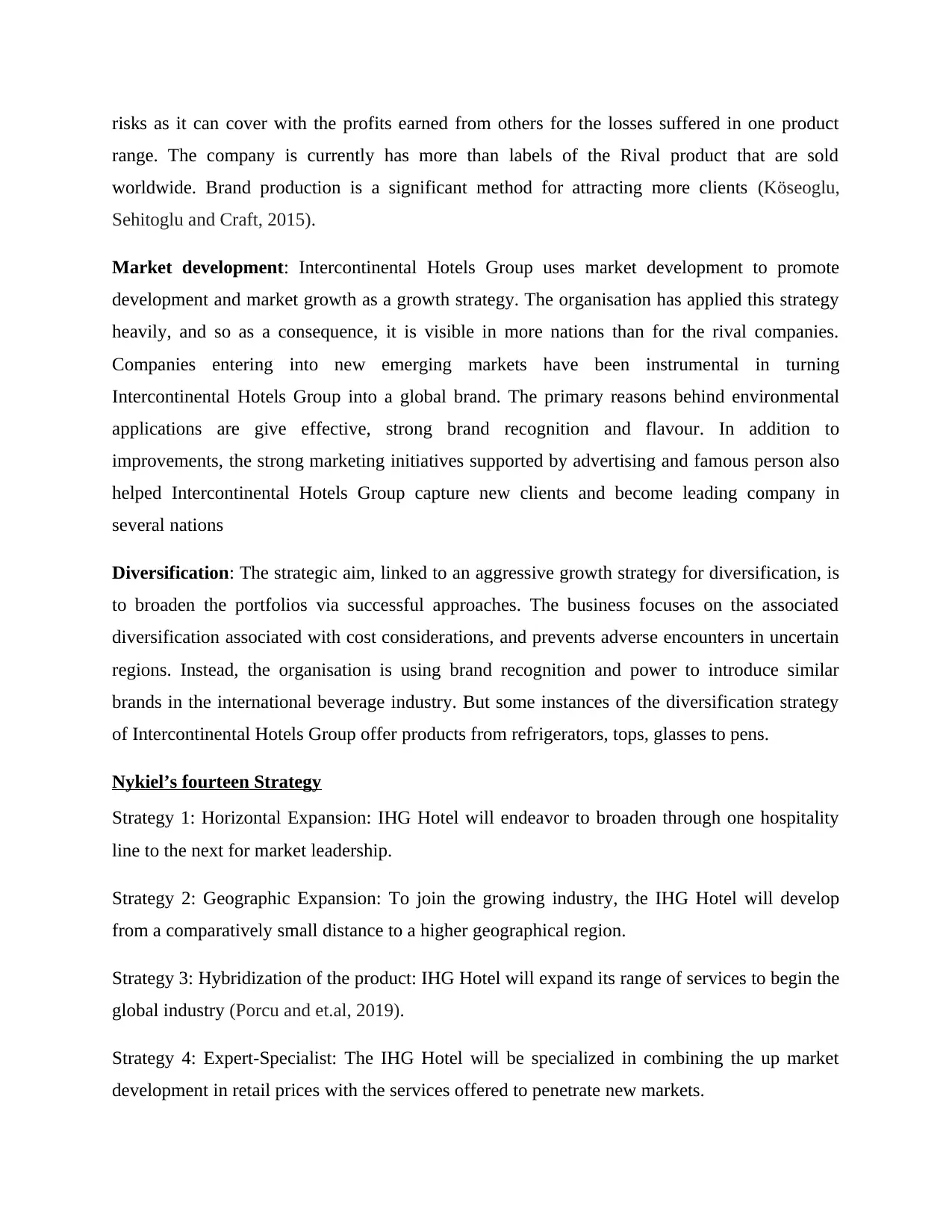
risks as it can cover with the profits earned from others for the losses suffered in one product
range. The company is currently has more than labels of the Rival product that are sold
worldwide. Brand production is a significant method for attracting more clients (Köseoglu,
Sehitoglu and Craft, 2015).
Market development: Intercontinental Hotels Group uses market development to promote
development and market growth as a growth strategy. The organisation has applied this strategy
heavily, and so as a consequence, it is visible in more nations than for the rival companies.
Companies entering into new emerging markets have been instrumental in turning
Intercontinental Hotels Group into a global brand. The primary reasons behind environmental
applications are give effective, strong brand recognition and flavour. In addition to
improvements, the strong marketing initiatives supported by advertising and famous person also
helped Intercontinental Hotels Group capture new clients and become leading company in
several nations
Diversification: The strategic aim, linked to an aggressive growth strategy for diversification, is
to broaden the portfolios via successful approaches. The business focuses on the associated
diversification associated with cost considerations, and prevents adverse encounters in uncertain
regions. Instead, the organisation is using brand recognition and power to introduce similar
brands in the international beverage industry. But some instances of the diversification strategy
of Intercontinental Hotels Group offer products from refrigerators, tops, glasses to pens.
Nykiel’s fourteen Strategy
Strategy 1: Horizontal Expansion: IHG Hotel will endeavor to broaden through one hospitality
line to the next for market leadership.
Strategy 2: Geographic Expansion: To join the growing industry, the IHG Hotel will develop
from a comparatively small distance to a higher geographical region.
Strategy 3: Hybridization of the product: IHG Hotel will expand its range of services to begin the
global industry (Porcu and et.al, 2019).
Strategy 4: Expert-Specialist: The IHG Hotel will be specialized in combining the up market
development in retail prices with the services offered to penetrate new markets.
range. The company is currently has more than labels of the Rival product that are sold
worldwide. Brand production is a significant method for attracting more clients (Köseoglu,
Sehitoglu and Craft, 2015).
Market development: Intercontinental Hotels Group uses market development to promote
development and market growth as a growth strategy. The organisation has applied this strategy
heavily, and so as a consequence, it is visible in more nations than for the rival companies.
Companies entering into new emerging markets have been instrumental in turning
Intercontinental Hotels Group into a global brand. The primary reasons behind environmental
applications are give effective, strong brand recognition and flavour. In addition to
improvements, the strong marketing initiatives supported by advertising and famous person also
helped Intercontinental Hotels Group capture new clients and become leading company in
several nations
Diversification: The strategic aim, linked to an aggressive growth strategy for diversification, is
to broaden the portfolios via successful approaches. The business focuses on the associated
diversification associated with cost considerations, and prevents adverse encounters in uncertain
regions. Instead, the organisation is using brand recognition and power to introduce similar
brands in the international beverage industry. But some instances of the diversification strategy
of Intercontinental Hotels Group offer products from refrigerators, tops, glasses to pens.
Nykiel’s fourteen Strategy
Strategy 1: Horizontal Expansion: IHG Hotel will endeavor to broaden through one hospitality
line to the next for market leadership.
Strategy 2: Geographic Expansion: To join the growing industry, the IHG Hotel will develop
from a comparatively small distance to a higher geographical region.
Strategy 3: Hybridization of the product: IHG Hotel will expand its range of services to begin the
global industry (Porcu and et.al, 2019).
Strategy 4: Expert-Specialist: The IHG Hotel will be specialized in combining the up market
development in retail prices with the services offered to penetrate new markets.
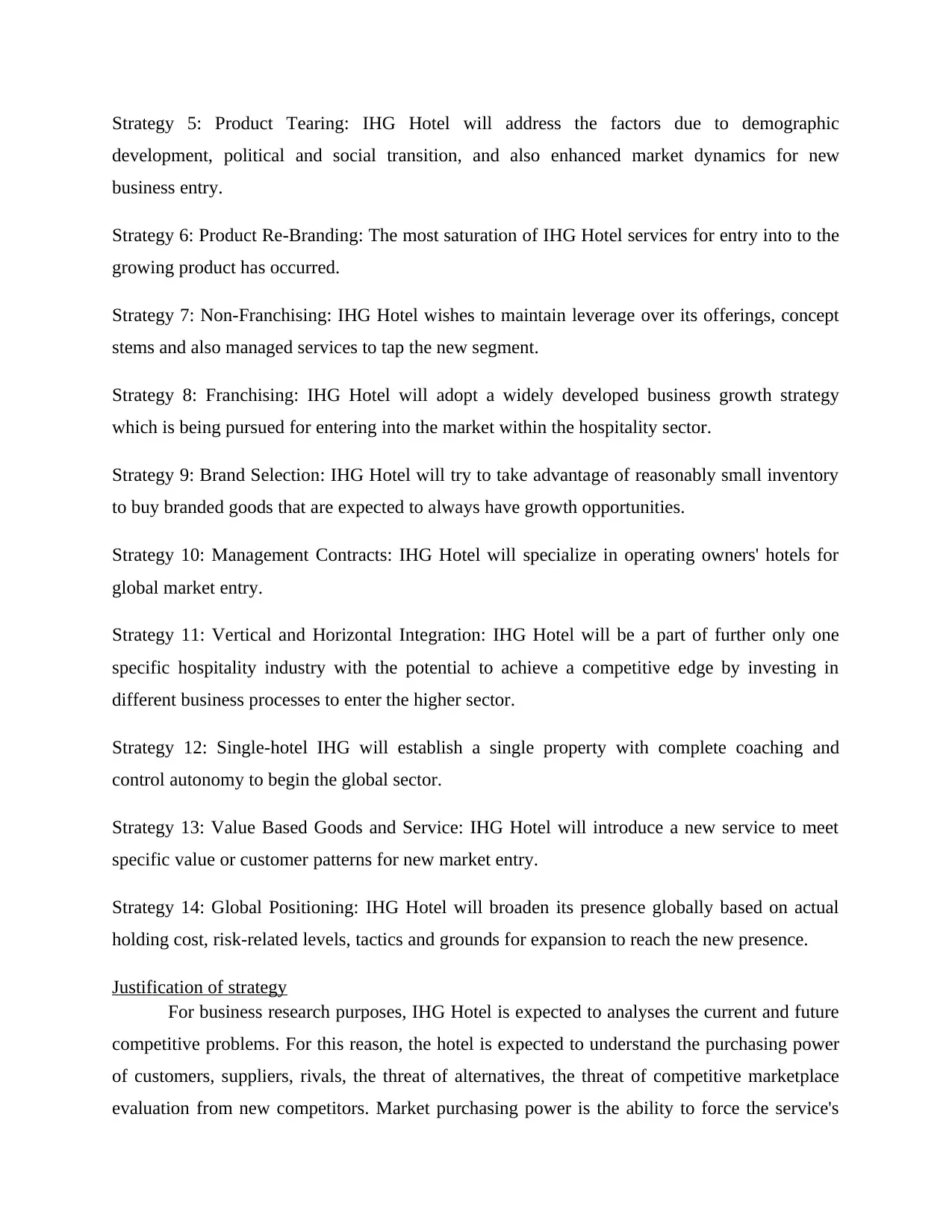
Strategy 5: Product Tearing: IHG Hotel will address the factors due to demographic
development, political and social transition, and also enhanced market dynamics for new
business entry.
Strategy 6: Product Re-Branding: The most saturation of IHG Hotel services for entry into to the
growing product has occurred.
Strategy 7: Non-Franchising: IHG Hotel wishes to maintain leverage over its offerings, concept
stems and also managed services to tap the new segment.
Strategy 8: Franchising: IHG Hotel will adopt a widely developed business growth strategy
which is being pursued for entering into the market within the hospitality sector.
Strategy 9: Brand Selection: IHG Hotel will try to take advantage of reasonably small inventory
to buy branded goods that are expected to always have growth opportunities.
Strategy 10: Management Contracts: IHG Hotel will specialize in operating owners' hotels for
global market entry.
Strategy 11: Vertical and Horizontal Integration: IHG Hotel will be a part of further only one
specific hospitality industry with the potential to achieve a competitive edge by investing in
different business processes to enter the higher sector.
Strategy 12: Single-hotel IHG will establish a single property with complete coaching and
control autonomy to begin the global sector.
Strategy 13: Value Based Goods and Service: IHG Hotel will introduce a new service to meet
specific value or customer patterns for new market entry.
Strategy 14: Global Positioning: IHG Hotel will broaden its presence globally based on actual
holding cost, risk-related levels, tactics and grounds for expansion to reach the new presence.
Justification of strategy
For business research purposes, IHG Hotel is expected to analyses the current and future
competitive problems. For this reason, the hotel is expected to understand the purchasing power
of customers, suppliers, rivals, the threat of alternatives, the threat of competitive marketplace
evaluation from new competitors. Market purchasing power is the ability to force the service's
development, political and social transition, and also enhanced market dynamics for new
business entry.
Strategy 6: Product Re-Branding: The most saturation of IHG Hotel services for entry into to the
growing product has occurred.
Strategy 7: Non-Franchising: IHG Hotel wishes to maintain leverage over its offerings, concept
stems and also managed services to tap the new segment.
Strategy 8: Franchising: IHG Hotel will adopt a widely developed business growth strategy
which is being pursued for entering into the market within the hospitality sector.
Strategy 9: Brand Selection: IHG Hotel will try to take advantage of reasonably small inventory
to buy branded goods that are expected to always have growth opportunities.
Strategy 10: Management Contracts: IHG Hotel will specialize in operating owners' hotels for
global market entry.
Strategy 11: Vertical and Horizontal Integration: IHG Hotel will be a part of further only one
specific hospitality industry with the potential to achieve a competitive edge by investing in
different business processes to enter the higher sector.
Strategy 12: Single-hotel IHG will establish a single property with complete coaching and
control autonomy to begin the global sector.
Strategy 13: Value Based Goods and Service: IHG Hotel will introduce a new service to meet
specific value or customer patterns for new market entry.
Strategy 14: Global Positioning: IHG Hotel will broaden its presence globally based on actual
holding cost, risk-related levels, tactics and grounds for expansion to reach the new presence.
Justification of strategy
For business research purposes, IHG Hotel is expected to analyses the current and future
competitive problems. For this reason, the hotel is expected to understand the purchasing power
of customers, suppliers, rivals, the threat of alternatives, the threat of competitive marketplace
evaluation from new competitors. Market purchasing power is the ability to force the service's
⊘ This is a preview!⊘
Do you want full access?
Subscribe today to unlock all pages.

Trusted by 1+ million students worldwide
1 out of 16
Related Documents
Your All-in-One AI-Powered Toolkit for Academic Success.
+13062052269
info@desklib.com
Available 24*7 on WhatsApp / Email
![[object Object]](/_next/static/media/star-bottom.7253800d.svg)
Unlock your academic potential
Copyright © 2020–2026 A2Z Services. All Rights Reserved. Developed and managed by ZUCOL.




